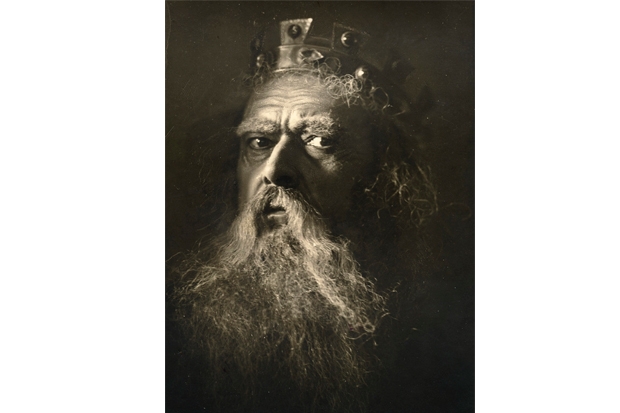In the 18th century, as Shakespeare began to take on classic status, editors began to notice differences between the texts of the plays preserved by his fellow actors in the posthumously published First Folio of his Comedies, Histories & Tragedies and those that had been published in the playwright’s lifetime in the cheap pocket editions, analogous to modern paperbacks, known in the trade as Quartos.
In the case of King Lear, the subject of Sir Brian Vickers’s new book, the Quarto of 1608 is strikingly different from the Folio of 1623. The Quarto has nearly 300 lines that are not in the Folio; the Folio has over 100 lines that are not in the Quarto; there are more than 800 verbal variants in the parts of the play that the two texts share. For a long time, the standard editorial response to this difficulty was to treat the Quarto as a ‘memorial reconstruction’ by actors — a phenomenon that accounts for the First Quarto of Hamlet, which includes the immortal and presumably half-remembered line ‘To be or not to be, ay, there’s the point.’ This was, however, a difficult position to maintain because Quarto Lear, although corrupt in many places, does not have the usual characteristics of memorial reconstruction.
In the 1970s the scholar Peter Blayney proved decisively by means of meticulous and highly technical bibliographic investigation that Quarto Lear was not a bad text based on actors’ memories but an authoritative one, almost certainly deriving from Shakespeare’s own holograph. The poor quality of the text was the result of the personnel in the printing shop being unused to drama. Thus the fact that much of Shakespeare’s verse was set as prose was due to the printer running out of the blocks that were needed to fill in the margins when setting verse. Blayney and a group of other scholars concluded that both Quarto and Folio texts were authentically Shakespearean. The substantial differences between them were to be explained by revision.
That plays change in the course of their stage life is not exactly news. Anyone who works in the theatre will tell you that. The editors of the 1986 OUP Shakespeare accordingly decided it would be worth illustrating the evolution of the text of King Lear by printing both the Quarto and the Folio versions. It was a shame that they chose sequential as opposed to parallel texts, which would have made comparison much easier, but the exercise was a valuable one, stimulating a wealth of interesting scholarly debate and challenging students to question their assumptions about the singularity of great literary works.
Now, though, Sir Brian Vickers rides into the lists with the intention of knocking the Oxford team off their chargers. There is, he announces, just one King Lear. He argues that the omissions in the Quarto were abridgements carried out by the printer because he was short of paper (which was expensive) and that those in the Folio were cack-handed actors’ cuts. The fons et origo, he concludes, was a single Shakespearean manuscript, so the right approach is the traditional one of conflating Quarto and Folio to reconstruct the lost original. The two-text Oxford school can, like Lear’s Fool, go hang.
Vickers may well be right that the Folio revision of King Lear was not a single, carefully crafted intervention by Shakespeare himself. The evolutionary nature of all theatre scripts would suggest that the changes are far more likely to have been gradual accretions over the years, some purposeful and others haphazard. But he is unnecessarily dismissive of what he calls the ‘ill-judged’ Folio text: it comes with the imprimatur of the actors who knew and loved Shakespeare, and it crystallises a moment in the evolving stage life of what Vickers calls Shakespeare’s ‘greatest pay’ (I assume that is a misprint for ‘play’, unless he has discovered some hitherto unknown box-office returns).
Folio Shakespeare offers a constant reminder of the collaborative nature of theatre, just as the Oxford school of editors worked as a team. But Vickers is not a team player. Over the past decade he has published a stream of books and articles arguing that all sorts of new ideas about the attribution of Shakespearean or possibly partially Shakespearean texts are wrong, and only he is right.
Vickers gained his reputation with some splendid books on the power of Renaissance rhetoric. But where Shakespearean rhetoric is all plenitude and wit, Vickers has, in the manner of certain other Elizabethans such as ‘snarling John Marston’, locked himself into the trope of vituperatio. He relishes the sneer and the jeer, is a master of the lofty dismissal and the throwing up of rhetorical hands in mock incredulity at the sheer stupidity of the younger generation of textual scholars and the gullibility of those older peers, such as Stanley Wells of the Shakespeare Institute, who have been taken in by their newfangled theories.
The polemical monograph, like the unremittingly barbed review, ought to be a young man’s game. It’s a sign of male insecurity, like revving a car at the lights. Few women feel the need to write such things. And when men approaching the age of King Lear do so, there is usually some sadness or bitterness or, to use the proper Shakespearean phrase, ‘ancient grudge’ lurking in the background. I have no idea what that may be in Vickers’s case, but there can be no doubting his insecurity.
Many historians and a handful of literary scholars have been knighted for their work but, as far as I am aware, Sir Brian is the only one to parade his knighthood on his title page instead of confining it to its due place in the blurb. Mind you, Shakespeare did something similar: King Lear is the one Quarto to announce the status of gentleman that its author purchased in order to restore the honour of his family name: it is attributed to Master William Shakespeare.





Comments